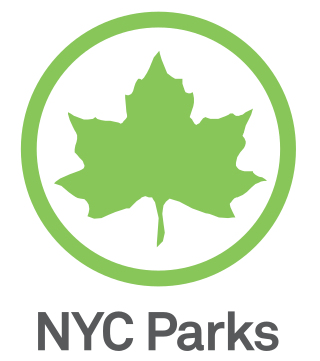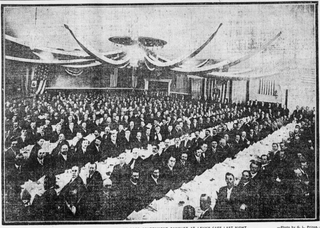The American Registry for Internet Numbers (ARIN) is the regional Internet registry for the United States, Canada, and many Caribbean and North Atlantic islands. ARIN manages the distribution of Internet number resources, including IPv4 and IPv6 address space and AS numbers. ARIN opened for business on December 22, 1997 after incorporating on April 18, 1997. ARIN is a nonprofit corporation with headquarters in Chantilly, Virginia, United States.

The Office of Management and Budget (OMB) is the largest office within the Executive Office of the President of the United States (EOP). OMB's most prominent function is to produce the president's budget, but it also examines agency programs, policies, and procedures to see whether they comply with the president's policies and coordinates inter-agency policy initiatives.
The council–manager government is a form of local government commonly used for municipalities and counties in the United States and Ireland, in New Zealand regional councils, and in Canadian municipalities. In the council-manager government, an elected city council hires a manager to serve as chief executive; this manager can be replaced by a simple majority at any time. It is used in roughly 40% of American cities.

The mayor of New York City, officially mayor of the City of New York, is head of the executive branch of the government of New York City and the chief executive of New York City. The mayor's office administers all city services, public property, police and fire protection, most public agencies, and enforces all city and state laws within New York City.

The governor of North Carolina is the head of government of the U.S. state of North Carolina. Seventy-five people have held the office since its inception in 1776. The governor serves a term of four years and chairs the collective body of the state's elected executive officials, the Council of State. The governor's powers and responsibilities are prescribed by the state constitution and by law. They serve as the North Carolina's chief executive and are tasked by the constitution with faithfully carrying out the laws of the state. They are ex officio commander in chief of the North Carolina National Guard and director of the state budget. The office has some powers of appointment of executive branch officials, some judges, and members of boards and commissions. Governors are also empowered to grant pardons and veto legislation.

The New York City Department of Parks and Recreation, also called the Parks Department or NYC Parks, is the department of the government of New York City responsible for maintaining the city's parks system, preserving and maintaining the ecological diversity of the city's natural areas, and furnishing recreational opportunities for city's residents and visitors.

The mayor of Toronto is the head of Toronto City Council and chief executive officer of the municipal government. The mayor is elected alongside city council every four years on the fourth Monday of October; there are no term limits. While in office, mayors are styled His/Her Worship.

Participatory budgeting (PB) is a type of citizen sourcing in which ordinary people decide how to allocate part of a municipal or public budget through a process of democratic deliberation and decision-making. Participatory budgeting allows citizens or residents of a locality to identify, discuss, and prioritize public spending projects, and gives them the power to make real decisions about how money is spent.

The Internet Governance Forum (IGF) is a multistakeholder governance group for policy dialogue on issues of Internet governance. It brings together all stakeholders in the Internet governance debate, whether they represent governments, the private sector or civil society, including the technical and academic community, on an equal basis and through an open and inclusive process. The establishment of the IGF was formally announced by the United Nations Secretary-General in July 2006. It was first convened in October–November 2006 and has held an annual meeting since then.

The municipal government of Toronto is the local government responsible for administering the city of Toronto in the Canadian province of Ontario. Its structure and powers are set out in the City of Toronto Act.
The International Trademark Association is concerned with protecting trademarks and complementary intellectual property via advocacy work and offering educational programs and legal resources.
Carolyn J. Lukensmeyer is an American activist who is a leader in the field of deliberative democracy, a public servant and social entrepreneur. She is Executive Director Emerita of The National Institute for Civil Discourse. In 1995, she founded AmericaSpeaks, a non-partisan non-profit organization that strengthens citizen voice in decision making. Carolyn was chief of staff to Governor Celeste of Ohio from 1986 to 1991. She was Consultant to the White House Chief of Staff for nine months during the Clinton years.

The United States has a history of citizen, nonprofit, and other non-partisan groups advocating good government that reaches back to the late-19th-century municipal-level Progressive Movement and the development of governmental professional associations in the early part of the 20th century, such as the American Public Human Services Association and the International City/County Management Association. Many of these groups had their genesis at the Public Administration Center at 1313 East 60th Street, at the University of Chicago.

Richard Greco Jr. is an American businessman, educator, former United States Government official, and long-standing trustee and benefactor of educational, cultural, and civic institutions. He was appointed by President George W. Bush of the United States and confirmed by the Senate as the nation's 19th Assistant Secretary of the Navy and served from 2004 to 2007.

Simon Sterne was an American lawyer, author and economist. As a lawyer he was active in various civic and corporate affairs.His writings include works about American history, politics and business.
The New York City Independent Budget Office (IBO) is a publicly funded agency of New York City that provides nonpartisan information about the city's budget and local economy to the public and their elected officials. The office has no policymaking role.
The University of Central Florida Student Government is the student body government for the University of Central Florida, a metropolitan public research university located in Orlando, Florida, United States. It is the largest Student Government within the state of Florida and one of the largest in the United States. It also often places in the top ten Student Governments nationally for the services and outreach it provides for the students it serves. SG also serves as the liaison between the student body and University Administration. The Executive, Legislative and Judicial branches as well as the Election Commission are governed by the student-adopted Constitution.

The Institute for Development of Freedom of Information (IDFI) - is a Georgian non-governmental organization which tends to support the development of an informed and empowered society for democratic governance. IDFI promotes human rights and good governance by raising civic awareness through sound informational reports, research and recommendations; Advocates for initiating & implementing reforms of policies, laws and practices to enhance democratic governance.

The District of Columbia State Board of Education (SBOE) is an independent executive branch agency of the Government of the District of Columbia, in the United States. The SBOE provides advocacy and policy guidance for the District of Columbia Public Schools, and works with the Chancellor of the District of Columbia Public Schools and the District of Columbia State Superintendent of Education. Charter schools are overseen by the District of Columbia Public Charter School Board.

The Mayor of the Liverpool City Region, is the directly elected mayor of the Liverpool City Region, who is responsible for regional governance over a number of issues, the Mayor has powers devolved to them from the Central Government, as well as this the mayor chairs the Liverpool City Region Combined Authority.














